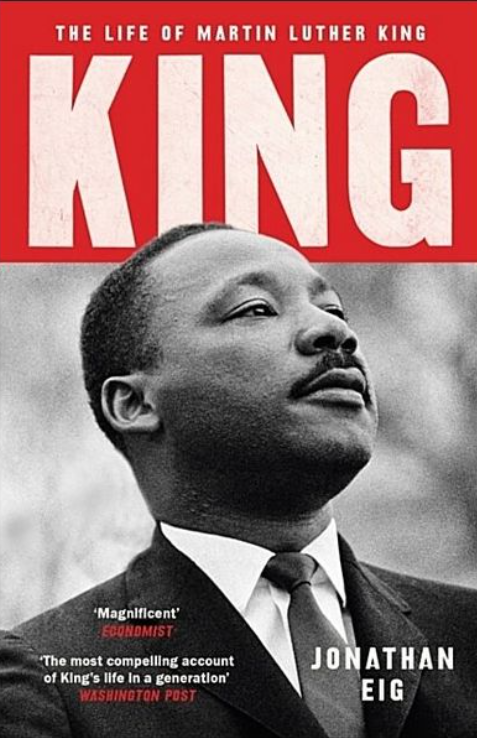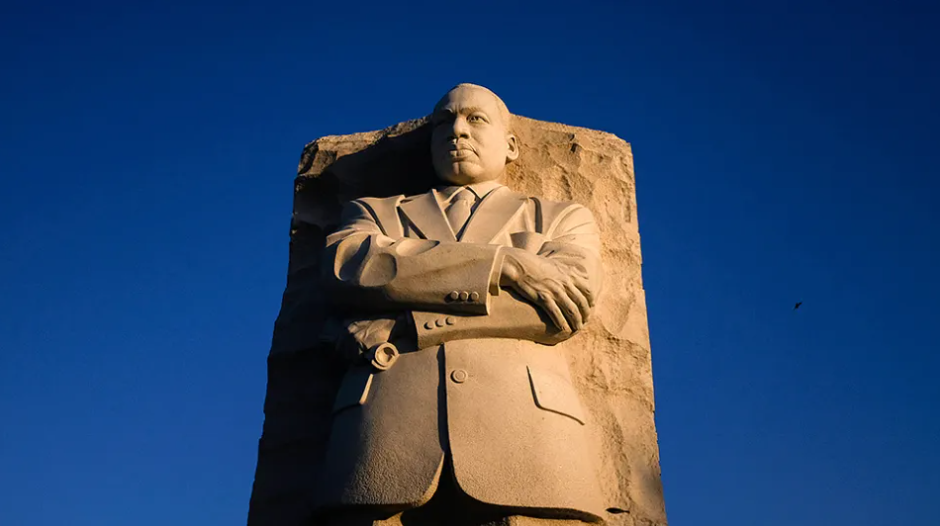Review: King: The Life of Martin Luther King, Jonathan Eig, Simon & Schuster
In his new biography of Martin Luther King, Jonathan Eig notes that none of King’s books were on sale at the gift shop when he visited the King memorial in Washington. Eig asserts that King, one of the most famous religious leaders of the twentieth century, is a symbol of harmony, but that his radical message has been not scrutinised of late. (One could say the same about Jesus Christ at times.) What is clear from Eig’s book is how inseparable King’s radical message is from his faith, especially in his insistence that positive change could only come through the moral high ground of nonviolence.
King’s father was, of course, a preacher – in Atlanta, where theology and social action went together by necessity. As a child, he played ‘preaching’ but didn’t initially want to be a minister – the emotionalism of the Black church embarrassed him. (He later realised it was a necessary ‘safety valve’.) But having a relatively stable and sheltered childhood, and later seeing racism so embedded in American society gave him a kind of guilt, Eig says, that spurred him.

He was student of the social gospel and was wary of a ‘dead religion’ that only focussed on the afterlife. King thought that change needed also to come from within individuals’ souls, but the Montgomery bus boycott, the first wave of civil rights, reinforced that evil could be systemic. The depth of racism shook his belief in innate goodness and seemed rather to confirm the insight of his namesake, the Reformer Martin Luther, that within human beings there is a deep sinfulness only redeemable by God.
As a religious leader, he reminded audiences that segregation was a moral issue never disconnected from God. His letter from Birmingham jail, almost as famous as Lincoln’s Gettysburg Address, would redefine American religious leadership, Eig says. It drew heavily on Christian theology to prompt Christian leaders to move beyond the pulpit.
King spoke of the rights enshrined in the constitution, but his language of protest was largely from the pulpit and Bible, both in delivery and content. The Exodus was a particularly rich analogy, unsurprisingly, since Black Americans were the descendants of slaves. He spoke of Black people being weary, just as the Israelites had been weary of their burdens in Egypt, in a land where the authorities were against them. He talked of the ‘promised land’, and like Moses, recognised that he would likely not see it himself.
Like Moses, King doubted his abilities to lead. In public, he seemed in command, in private he lacked certainty. He knew he was a speaker, not an organiser. His numerous affairs led him to recognise his own sinfulness, like King David, but he took comfort in the promises of forgiveness and redemption. Although he feared for his life, his faith gave him a sense that his own life was subordinate to the cause.
The Black Panthers argued that King and the Black church were conservative and polite, ineffective and subservient. As well as being deeply embedded in the culture of the Black church, and using its potential for mass action, King argued, rather, that nonviolence, to which he was inspired by Ghandi as well as Christ, was the more radical approach. Whites in the South agreed with the Black Panthers that nonviolence was ‘nonsense’. But King saw violence as the easy option, a kneejerk reaction that simply escalated division. The likes of Malcolm X simply played into the hands of the FBI and local authorities who wanted an excuse to clamp down on civil rights demands.
There was a practicality to nonviolence – King rightly saw it as the only way to bring most of the American public with the movement. But there was also a moral high ground – nonviolent protest would shame American whites into seeing the deep moral failure of the country of which they were so proud, and of themselves individually.
Nonviolence required bravery. It was not passive or meek. Peaceful protest in white suburbs was like Jesus enraging the religious authorities. Black Power separatists, in contrast, were like the zealots of Jesus’ day. As well as inviting violent reaction, they succumbed to hate. King always preached love, and this desire to bring reconciliation may have seemed naïve in the face of such depraved antagonism, but it was also radical. King preached more than justice – he invited his fellow activists to love white aggressors, just as Christ had done.

King was also just as radical in his later protest against the Vietnam war. He decided that as a follower of Christ the peacemaker he couldn’t preach the gospel without calling out injustice everywhere. This became another challenge to his fellow ministers, who sometimes hid within the safety of the church. He protested about poverty, and criticised the ongoing war, simply confirming, for the FBI and others, that King had been corrupted by communist ideology. But King was never convinced by communism; his faith drove him to see the ubiquity of injustice, of evil. And he believed that the Christian Gospel is not just a promise of eternal reward but, as Saint Paul had radically argued, a force for the destruction of divisions of all sorts.
Nick Mattiske blogs on books at coburgreviewofbooks.wordpress.com and is the illustrator of Thoughts That Feel So Big.













